Strange, slow and spectacular, No Man's Sky is proper sci-fi
Reach for the stars: The first hands-on with Hello Games' epic.
Well over two years after No Man's Sky was unveiled, Hello Games' Sean Murray is still fielding the same question that's been circling this game from the very start. And each and every time he's answered it patiently, diligently and, somewhat commendably, without displaying any frustration at having to repeat himself all over again. So, with No Man's Sky finally available in playable form during a press event, let's run through this one more time. Just for old time's sake. What is it you actually do in this game?
Quite a lot, as it turns out.
We're assembled on the top floor of Millbank Tower on a rare clear London night ahead of our first proper chance to go hands-on with the game, the stars in the sky beyond the windows twinkling on cue as Murray runs through the systems that underpin the inconceivably vast universe that he and his team - with the help of some clever maths - have created out of a small studio in Guildford. There are a fair few of them, it soon transpires: this may well be more game than you were expecting.
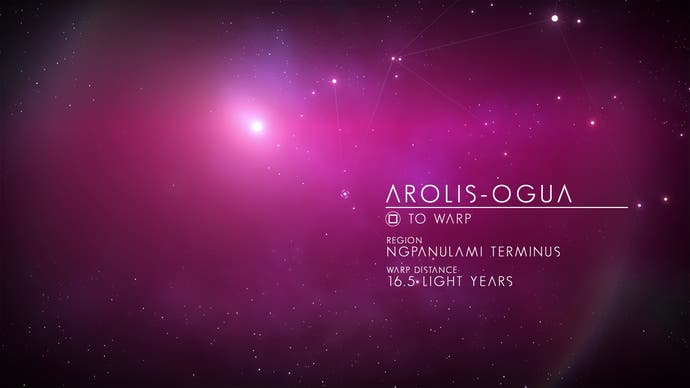
No Man's Sky is, in the most basic possible terms, a survival role-playing game, in which your ultimate aim is to reach the centre of the universe. You start off on the outer edges, short of the means that will get you to your goal, so you go about gathering what's required to help push you further into the stars.
Planetside, you can gather materials by plucking away at the flora or mining down into rocky surfaces using your weapon. There are sentinels that keep you in check, should you get too reckless or start taking things that aren't yours - No Man's Sky is governed that way by a familiar five-star 'wanted' system that sees attention escalate the more you take - yet it's still possible to greedily carve out entire caves before setting off with armfuls of precious resources.
You'll need these to craft better items, which you'll need, in turn, to survive the hostile environments on some planets, and to discover new ones. Perhaps you chance across a blueprint in a downed ship which, with the right materials, helps you build a better gun; or maybe you're just looking to upgrade your suit so you can see through the sub-Arctic conditions of a planet that's at the outer limits of its star system.
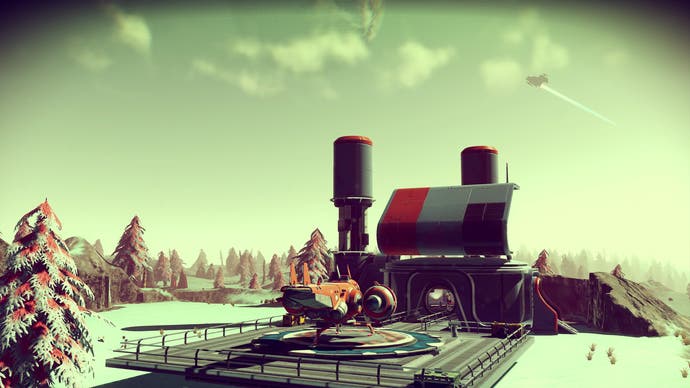
Maybe you want a better ship with a little more range, or more fuel to help you get that little bit further. Best venture over to one of the many trading posts, and see if you can barter with one of the civilised alien races that populate the universe - though, first, you're going to have to learn to speak their language, your understanding enhanced by interacting with monoliths that are scattered across planets.
There are races and factions, traders and pirates and organisations with which allegiances can be formed. Find yourself in the depths of space riding alongside a flotilla of freighter ships when a pirate attacks, and you'll find that convoy comes to your aid - or, alternatively, you could open fire yourself on the cargo holds that bulge out until they explode, gathering up some of that loot for yourself. An ally lost, a hold full of carbon gained; it's a vast space that No Man's Sky offers, but it's underpinned by a framework that's sturdy, perhaps even familiar.
This is a universe with its own lore, and a deeper sense of purpose for the player that's slowly revealed through exploration. It's perhaps the biggest revelation of this latest round of media previews (perhaps the last before No Man's Sky's release in June) that this universe of some 18,446,744,073,709,551,616 planets is bound together by a fiction and governed by a narrative logic. It seems like a smart way to impose some of the structure that so many players crave.
So, what do you do in No Man's Sky? In theory you play a fairly robust, expansive role-playing game with near limitless horizons. In theory, at least. In practice, it's a much different game - in my hands, anyway. In my 30 minutes with the game, taking place in a partitioned star system and under the supervision of Hello Games' artist Grant Duncan (who's helped design and bring to life the spectacular aesthetic), it's a slow, plodding game of exploration - perhaps the very game that some feared it would be.
We start on the frosted planet of Balari V, whose surface boasts temperatures of some -160 °C. That's on its sunny side, too - you can get in your ship and chase the sunset, should you desire, or simply jet around to see the planet surface under cover of nightfall. You could find a waypoint that'll let you know local points of interest - trading posts, landing pads where you can summon your ship or bountiful pools of resources. They're all options - as is the one of taking a leisurely stroll.
Take in all the flat tundra, get lost in the chilly storm and stumble across a ponderous tusked beast, slowly walking with winged forearms and impossibly skinny hind legs. Look up to the heavens and see the vapour trail of ships passing by, traders on their routes from planet to planet. You could, if you want, jump in your ship and follow them - take them down for the bounty they hold, or maybe see where they land and try to get the goods first. Or, you could just walk.
The breadth of No Man's Sky probably deserves more than to be played like a high-concept Proteus, but the beauty of it makes me struggle to approach it in anything other than a pacifist mindset. I'm even reluctant to mine those vivid landscapes, and the only time I raise my pistol is later, once we've escaped Balari V's atmosphere and landed on the more verdant Yavil, where I'm attacked by what looks to me in the heat of the moment like a dick-billed platypus. Even then, it's only a warning shot.
In all that pink and purple space between the planets it's hard not to wander peacefully between clusters of asteroids. At one point a pirate ship attacks, but we're too busy admiring the detailing on a great white whale of a freighter to fight back, our death sending us to a space station where once again it's hard not to slow the pace and just take it all in. There are surprising little incidentals - chairs that can be spun in one of its rooms, or the lamp that can be switched on and off, much to the annoyance of the alien trader who watches on in bafflement at our dumb wonder at it all.
The time is over too soon - my own fault, admittedly, for being so leisurely about it - yet it's enough to leave a lasting impression. There's a magic to No Man's Sky, one reminiscent of other mystical space-faring adventures such as Star Raiders or Noctis: the kinds of games you'd glimpse in a few stolen hours around a friend's house and then dream about for months afterwards. It's a slow game, and if you're playing aggressively it seems that it can be a clunky and frustrating one at times. This isn't going to be for everyone - the systems, as abundant as they may be, may well run dry for most players after a mere handful of hours, and many more may find that space is too empty, too meaningless, despite Hello Games' best efforts to fill it with some sense of purpose.
What's left at that point? Nothing but the beauty of it all, and the fantasy of getting in your ship and heading to the skies, pointing it somewhere, anywhere, you care to go. No Man's Sky probably isn't going to satisfy all those drawn in by its spectacular premise, and by that intoxicating reveal; it's too weird, too different, to ever really do so. What it does, though, is deliver on the promise of that initial trailer. It's a proper sci-fi game - at times strange, lonely and cold, yet full of heart-lifting spectacle. And that, for me, is more than enough.
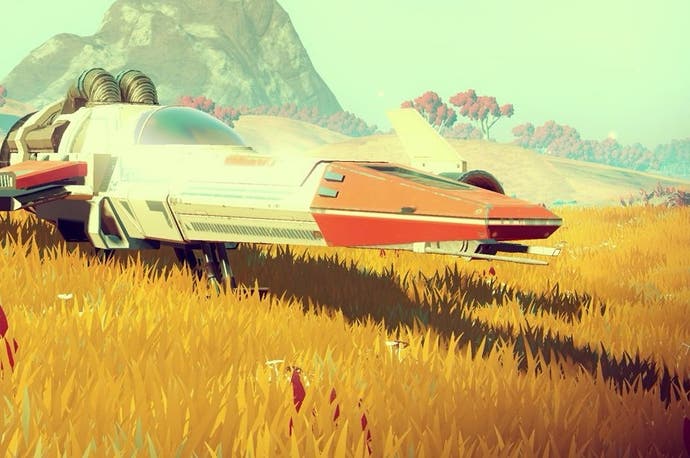



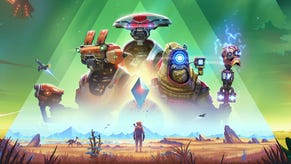
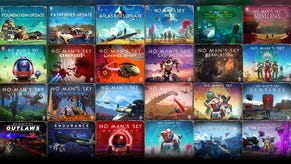
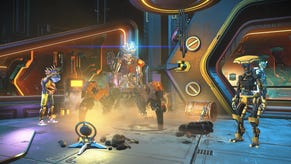
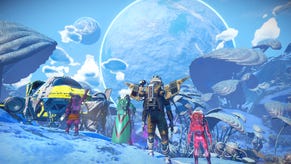
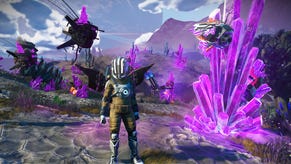

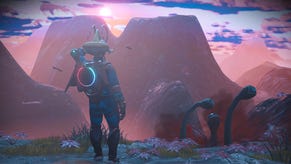



.png?width=291&height=164&fit=crop&quality=80&format=jpg&auto=webp)



